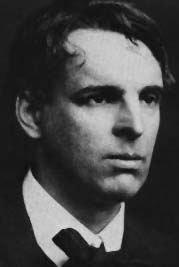W. B. Yeats was an Irish poet born in Dublin. He spent some of his youth in London, returning with his parents and siblings to Ireland in 1881, only to return to London again with his family in 1887.
 Yeats always felt his vocation to be that of a poet. His first poems were published in 1885 in the Dublin University Review. This was the beginning of an extremely large oeuvre of poetry and plays. Outside of his writing, he was interested in theosophy and was a member of the Golden Dawn, as well as holding membership to many literary and hermetic clubs. He was friends with fellow poet Ezra Pound, and was awarded the Nobel Prize for Poetry in 1923.
Yeats always felt his vocation to be that of a poet. His first poems were published in 1885 in the Dublin University Review. This was the beginning of an extremely large oeuvre of poetry and plays. Outside of his writing, he was interested in theosophy and was a member of the Golden Dawn, as well as holding membership to many literary and hermetic clubs. He was friends with fellow poet Ezra Pound, and was awarded the Nobel Prize for Poetry in 1923.
Yeats is known for the contradictions in both his life and work, particularly between his Romanticism and his Modernism. He saw himself as one of the ‘last Romantics’, but is also situated as part of the Modernist movement as well. His identification with Romanticism is evident in his work through the celebration of Irish myth and legend, the supernatural and pastoral themes. “The Lake Isle of Innisfree” (1890) is a poem that is connected to this period, where Yeats idealises a small lake island from his youth as a place of escape.
He later began to write poetry in a more Modernist style as a response to the new world with the advent of the First World War, as well as the turbulence he was witnessing in Ireland’s civil war which was also flaring up at that time. The poems that are associated with this style begin with his collection Responsibilities (1914). The poem “September 1913” is a hallmark of Yeats’ Modernist style, as it engages with the present rather than the past as found in his Romantic poetry, though it does compare the present unfavourably with the past.
He was also contradictory in his relationship with Ireland. He was both patriotic towards and heavily critical of his home country. He strongly supported independence from Britain, but was appalled at the violence that was used to try and achieve it. His poem "The Second Coming" describes his feeling that events were spinning out of control, that the worst and most violent elements had the upper hand, and that 2000 years of Christian civilisation may be at an end.
Yeats became a monumental fixture in modern poetry. His critical reputation was secured when T. S. Eliot gave a lecture entitled “The Poetry of W. B. Yeats” at the Abbey Theatre in June 1940. There has been consistent scholarship on his poetry ever since.